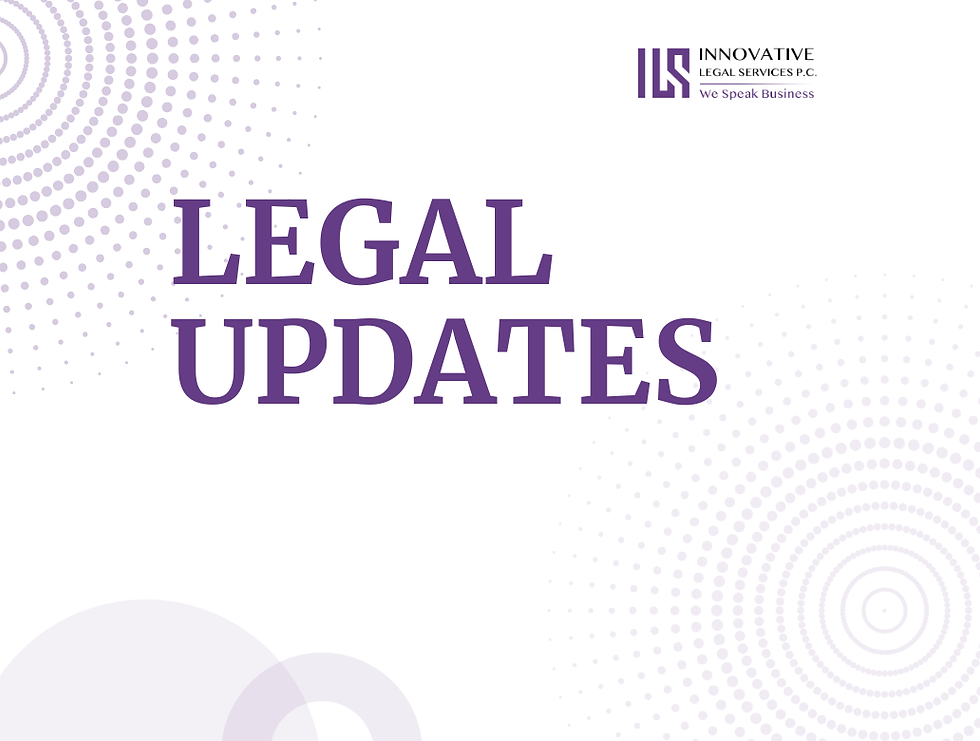Department of Labor Publishes 2024 Rule on Independent Contractor Classification
- Richard Liu
- Jan 12, 2024
- 3 min read
Updated: Apr 25, 2024
On January 9, 2024, the U.S. Department of Labor (DOL) published the final rule redefining the term “independent contractor” under the Fair Labor Standards Act (FLSA). This rule, which supersedes the 2021 regulation, introduces a six-factor test centered on the “economic reality” of the worker-employer relationship (also known as the “Economic Reality Test”), significantly impacting the classification of independent contractors in the United States. Here is a quick overview.
For additional information regarding the Economic Reality Test, and to find out how this could impact your business, please contact our Managing Partner, Richard Liu, at richard.liu@consultils.com.
The Previous Rule: Two Core Factors
The 2021 rule, issued in January of that year, streamlined the worker classification analysis. It emphasized two “core” factors:
the nature and degree of control over the work and
the individual’s opportunity for profit or loss.
This approach de-emphasized other factors, such as the skill required for the work, the permanence of the working relationship, and whether the work was part of an integrated unit of production.

Shift in Focus: The 2024 Rule
Emerging from the DOL’s 2022 proposal, the 2024 rule directly challenges the 2021 rule's approach, proposing a return to a broader six-factor analysis that emphasizes the totality of the circumstances in each case.
Key Elements of the Economic Reality Test
The Test: The Economic Reality Test establishes a six-factor test to determine whether a worker is an employee or an independent contractor. These factors include: (1) The worker’s opportunity for profit or loss. (2) Investments by the worker and potential employer. (3) The degree of permanence of the relationship. (4) The nature and degree of the employer’s control over the work. (5) The extent to which the work is integral to the employer’s business. (6) The worker’s skill and initiative.
Under this test, no single factor is determinative, and all relevant factors are considered in each case.
Legal Compliance Adjustments: The rule clarifies that control necessary to comply with specific legal requirements does not necessarily indicate that the worker is an employee.
Refinement of Investment Factors: The rule states that investments by the worker and potential employer will not be compared on a dollar-for-dollar basis. Instead, the nature of the investments will be examined to determine if they suggest independent operation.
Tools and Equipment: The rule specifies that costs unilaterally imposed by the potential employer for tools and equipment do not necessarily indicate independent contractor status.
Legal Implications and Ongoing Litigation
The legal journey of the 2024 rule has been complex. Following the DOL’s attempt to withdraw the Trump-era rule, a Texas federal court found the withdrawal procedurally flawed. The case is currently on hold, pending the outcome of the new rulemaking. Employment law experts anticipate the rule may face legal challenges, similar to other regulations under both current and previous administrations.
Key Takeaways for Employers
Employers, especially those heavily reliant on independent contractors, should closely examine this new rule. The DOL’s stance is clear: the rule aims to reduce misclassification risks and provide a consistent approach for businesses. However, it also presents potential challenges in classification practices. Employers are advised to review their working arrangements and seek legal counsel to ensure compliance.
For additional information regarding the Economic Reality Test, and to find out how this could impact your business, please contact our Managing Partner, Richard Liu, at richard.liu@consultils.com.

Richard Liu, Esq. is the Managing Counsel of ILS. He serves clients as a management-side defense lawyer specializing in employment and business litigation. Richard is also an expert on litigation prevention and compliance. He regularly advises Fortune 500 companies and startups on employment, labor, and commercial matters.
Email: richard.liu@consultils.com | Phone: 626-344-8949
*Disclaimer: This article does not constitute legal opinion and does not create any attorney-client relationship.


Comments